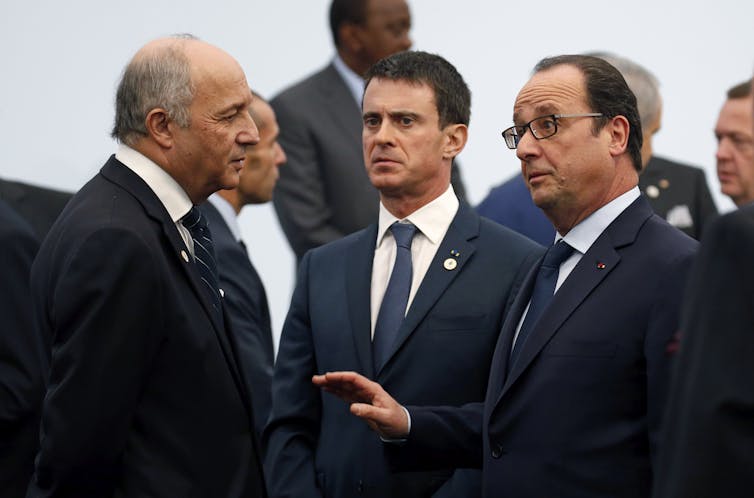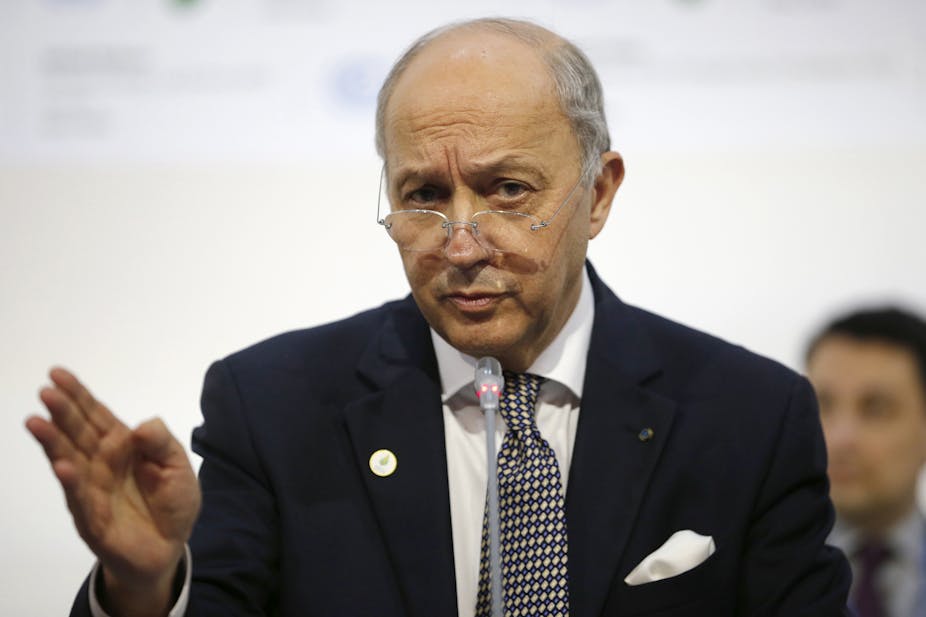It was hard to imagine, as the Paris Conference on Climate Change came to an end, that foreign minister Laurent Fabius might have been reluctant for France to host the event. But reluctant he had been. Such meetings, he argued, were difficult to manage and rarely a success.
President François Hollande, however, saw it as the foreign affairs centrepiece of his presidency and pressed for the bid to go ahead.
Whatever his reservations, Fabius spared no effort in preparing the conference. He got to grips with the scientific detail, handled the diplomatic side and oversaw the creation of the conference village at the Parc des Expositions in the north of the city. It was his show and he was determined to make it work.
And in the end, the event was such a success, the diplomacy so delicately delivered, that Fabius has begun to be tipped for a bright future. And with an election on the horizon in 2017, questions may well be asked about whether he would make good presidential material – better at least than Hollande.
But Laurent Fabius is a man whose time has been and gone. He is one of those elder statesmen whose careers, when put under the spotlight, turns out to be a catalogue of disappointments.
Rising star
Fabius joined the Parti Socialiste (PS) in 1974. His technical brilliance saw him rise within party leader François Mitterrand’s entourage and he was given a central role in the run-up to the 1981 presidentials.
After Mitterrand’s triumph that year, Fabius was rewarded with a junior ministerial role before becoming minister for industry in 1983.
In 1984, with two years before the next general election and the left staring down the barrel of defeat, Mitterrand opted for a coup de théâtre, appointing 37-year-old Fabius as France’s youngest ever PM.
He set about a raft of reforms to try and tackle unemployment, but the results were mediocre. He also had to spend a rather significant amount of his time dealing with the fallout of the sinking of the Greenpeace ship Rainbow Warrior – an action over which he had had little influence.
The PS lost the 1986 general election and Fabius spent much of the next two decades trying, with little success, to take control of the party. When he finally achieved his aim, the party suffered its worst electoral reverse in its history, in 1993. The left were back in power four years later, but with Fabius’ arch rival Lionel Jospin as PM. Fabius hovered on the sidelines until 2000, when he replaced Dominique Strauss-Kahn as finance minister.
On your bike, Laurent
By the time the 2002 presidential election came around, the left fully expected Jospin to defeat the incumbent Jacques Chirac. Instead he was roundly defeated.
The blow was nothing less than a message from above for Fabius. With the way now clear to the 2007 presidential election, he set out, on his motorbike, to try to reconnect with the French people. The upshot was a book entitled Cela commence avec une balade (it begins with a journey). In an interview following the book’s publication, Fabius revealed that he thought about being president “even when I shave in the mornings”.
His peregrinations and reflections had led Fabius a little to the left and he became something of a Eurosceptic. In 2005 he was the figurehead of a minority group within the PS that campaigned against introducing a European constitution, even though the party as a whole was in favour. While others left as a consequence of this disagreement, Fabius remained to fight the 2006 presidential primary against Strauss-Kahn and Ségolène Royal.

But Fabius never quite shook off the air of being yesterday’s man. He did nothing to enhance his cause by expressing sexist views about Royal. He got his comeuppance when he finished third, with 19% of votes to her 60%.
That marked the end of his presidential ambitions. He steered the middle path and firmly backed Hollande as a presidential candidate. Then, when he won, Fabius began to lay the foundations for his future career.
No spring chicken
Hollande had always focused his efforts within the party. He had never been a minister, had few contacts outside France and, consequently, found it difficult to get any kind of purchase on the world stage.
By contrast, Fabius had not been in politics for 40 years without making a few connections overseas. As soon as Hollande took office, Fabius set about working these contacts on the president’s behalf. The reward was a post as foreign minister and an honorific nomination as number two in the government.
His contacts of course came in handy once again as COP21 came to town. Fabius was hailed as playing the central role in achieving a deal to aim to limit global warming to no more than 1.5°C above pre-industrial temperatures.
And yet, it seems unlikely that this latest success would make Fabius a potential presidential candidate for 2017, even if Hollande decides not to run.
Current PM Manuel Valls and other young pretenders have always had 2022 in their sights. Martine Aubry is another name certain to do the rounds. But there were questions in 2011 about whether she really wanted the job and those have not gone away.
Some would be happy enough to see a contest between Fabius and Alain Juppé, who in some ways is his mirror image among the Republicans. But the man who was once the youngest PM will be 71 in 2017. Right now, the French are looking across the Pyrenees to Spain and wondering if the generation that came to prominence in the 80s shouldn’t be moving on to make way for a new breed. What if disaffection with politics and the rise of the Front National are linked to the same old faces dominating the political scene?
Does Laurent Fabius still think about being president when he shaves in the morning? It is more likely (and rather to be hoped) that he thinks, whilst wielding the Bic disposable, about Syria and the other items in his ministerial portfolio. And anyway, the unexpected and undoubted success of COP21 isn’t such a bad legacy to leave behind.

